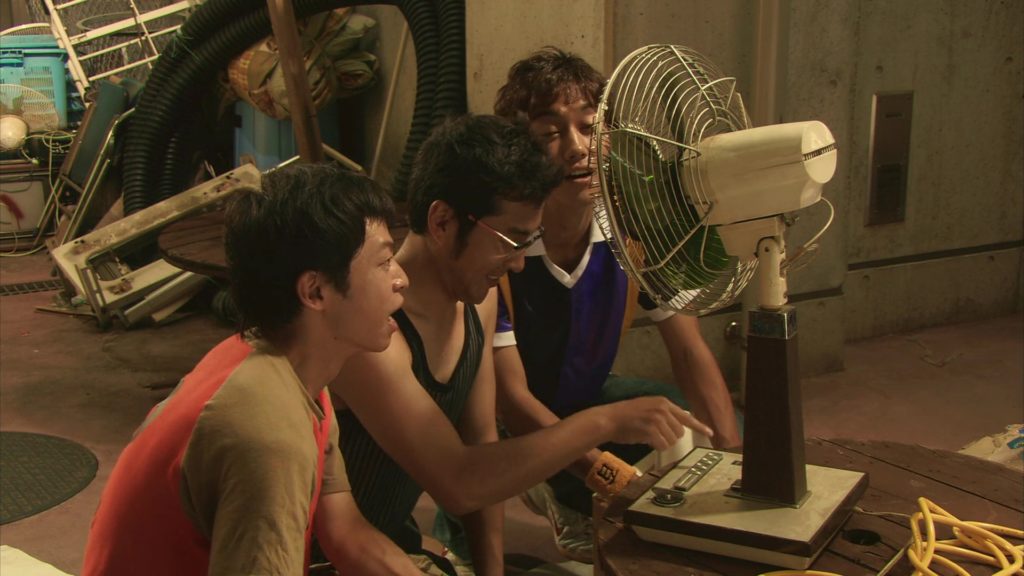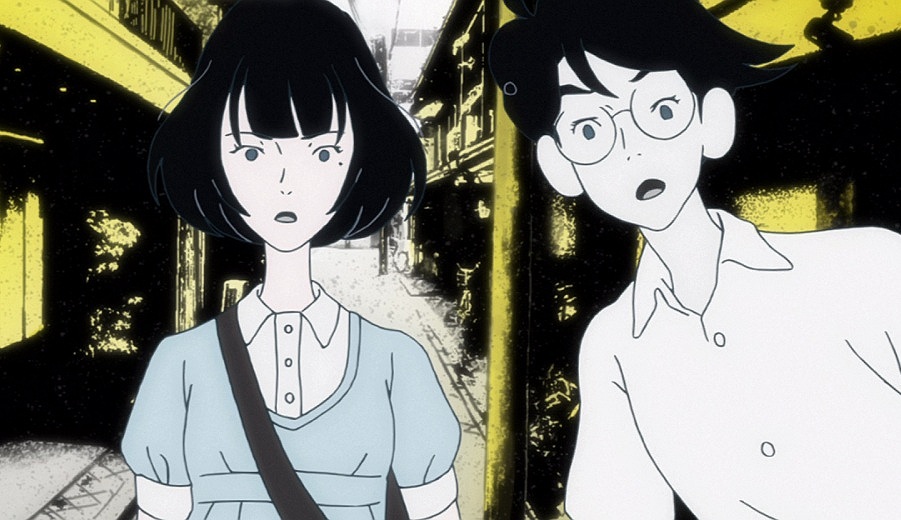February 6, 2023
·
0 feedback
By Tom Wilmot.

Writers are inclined to have a motif, an concept or theme that persists all through their work, distinguishing their tasks and permitting them to kind an inventive id. Within the case of Makoto Ueda, this concept is one in every of time. The co-founder of the theatre group Europe Kikaku has toiled on many wonderous sci-fi tasks over time, whether or not they be comedic stage productions or tailored screenplays. Nevertheless, from his private shorts to feature-length movies, taking part in with time has remained an indicator of Ueda’s work.
To know why time has performed such a significant function in Ueda’s growth as a author, we’ve got to leap again to 2001, the yr of Europe Kikaku’s first huge on-stage hit, Summer season Time Machine Blues. Sci-fi comedy has at all times been the theatre group’s bread and butter, so it’s no shock that Ueda’s first bona fide hit concerned a bunch of over-zealous teenagers who stumble throughout a time machine throughout their summer time break. The troupe have additionally dabbled in tales of UFO abductions and physicists having a Christmas social gathering, however it was the sun-soaked time journey caper that caught the attention of director Katsuyuki Motohiro. Enamoured with the story and its cinematic potential, the filmmaker approached Europe Kikaku and Ueda with the prospect of a big-screen adaptation, which ultimately hit cinemas in July 2005.

Broadening the dimensions of the unique stage-play, Summer season Time Machine Blues follows the boys of a high-school sci-fi membership as they uncover a time machine despatched again 25 years from the long run. Given the sweltering summer time warmth, the boys naturally resolve to make use of this new-found time-toy for an vital mission – retrieving the air conditioner distant that was damaged the day earlier than. Nevertheless, meddling with the material of time poses a severe menace, one which the blokes and gals of the sci-fi and pictures golf equipment should quell in the event that they’re to keep away from disappearing from the world solely…doubtlessly.
Shaking off the restrictions of a stage manufacturing, Ueda provides contemporary and bold plot parts to the movie, profiting from new environments and conjuring up extra whacky excessive jinks for our band of teenaged heroes. A mysterious case of stolen shampoo from a bathhouse and the native legend of a sacred kappa all issue into this absurd story. Motohiro’s restrained directorial method and stylistic preferences elevate this new materials, as he litters the body with visible clues for us to piece collectively later. Significantly enjoyable are the horizontal split-screen scenes, which juxtapose the 2 concurrent timelines of previous and current to display additional how time journey works on this world.
In a brand new interview included with Third Window Movies’ Blu-ray launch of the film, Ueda notes that you simply’d sometimes anticipate a movie model of a stage manufacturing to be a lot grander in scope. But, it’s exactly the small scale really feel of Summer season Time Machine Blues that offers the movie its appeal. There’s no overbearing, world-ending plot or fate-shifting narrative at hand, only a band of boisterous high-schoolers who occur to disrupt the space-time continuum. Some not-so-subtle nods to Again to the Future (1985) and even H.G. Wells’ traditional sci-fi novel, The Time Machine, add a tongue-in-cheek ingredient to a movie as Ueda’s story rolls mischievous teen-comedy and upbeat sci-fi journey into one.

And but, Summer season Time Machine Blues is however one in every of a number of Makoto Ueda-penned tasks that play with the idea of time journey. The screenwriter has turned director on a handful of private quick movies that discover other ways of visualising time journey. Two of the shorts included on the brand new launch, Time Machine and A Little Fugue of Love, discover primary time journey ideas and taking pictures strategies, whereas 2014’s Howling is successfully a trial run for Europe Kikaku’s first characteristic movie, Past the Infinite Two Minutes (2020). Penned as soon as once more by Ueda, the latter is an formidable and progressive exploration of a TV-induced “Droste impact”, primarily an infinite time loop that permits a espresso store proprietor and his buddies to see a number of minutes into the long run.
With all of those tasks, Ueda has established his personal guidelines for time journey, disposing of the concept of parallel worlds and limiting his tales to 1 clear timeline. A self-confessed stickler for precision and order, the screenwriter describes each Summer season Time Machine Blues and Past the Infinite Two Minutes as “time-puzzles that are accomplished on a really small scale”. Whereas Ueda admits that his time journey plots would possibly come throughout as too technical, administrators Katsuyuki Motohiro and Junta Yamaguchi have made these tales as thrilling to look at as they’re enjoyable to deconstruct.

With a penchant for time journey and weird sci-fi typically, it’s maybe no shock that Ueda has penned anime diversifications of a number of fantastical novels from prize-winning writer Tomihiko Morimi. The primary and arguably most beloved of those diversifications is The Tatami Galaxy (2010), an 11-episode sequence co-written with director Masaaki Yuasa. These acquainted with the story will know that it follows a Groundhog Day-like narrative, as our unnamed scholar hero returns to a pivotal level in early college life, altering his selections in pursuit of raven-haired maidens and a rose-coloured campus life.
Ueda had his work reduce out for him on the sequence, provided that the 2004 novel options solely 4 alternate timelines for our protagonist to discover, whereas the sequence has one for nearly each episode. Morimi has acknowledged the numerous function that Ueda performed in broadening the story’s scale, even additional growing characters who’re solely bit-part gamers within the novel. Whereas the function of time journey is minimal in The Tatami Galaxy, the concept of doing-over components of your life to make the “proper” alternative crosses over with themes of selfishness in Ueda’s previous work. In most of the screenwriter’s live-action tasks, these blessed with the present of time journey shortly use it for self-gain, whether or not to assist them win a scratch card, land a date, or retrieve a easy air con distant.

The Tatami Galaxy marks one in every of three Morimi novels that Ueda has tailored in recent times, the opposite two being Yuasa’s non secular sequel, Night time is Quick, Stroll on Lady (2017) and Hiroyasu Ishida’s Penguin Freeway (2018). Whereas the previous doesn’t take care of time as an idea immediately, the year-long story in Morimi’s novel is shrunk down to 1 impossibly lengthy evening. There’s additionally the sobering distinction between how time is skilled by the outdated and the younger, with the aged Rihaku-san surrounded by clocks with frantically spinning palms – an exquisite visible nod to the sensation of time slipping away the older we get. As if writing the movie wasn’t sufficient, Ueda has managed to carry Morimi’s wild story to the stage, with Europe Kikaku’s Night time is Quick, Stroll on Lady touring in the summertime of 2021.
Time continues to work in mysterious methods, particularly now that Ueda’s profession is closing a time loop of its personal. Tatami Time Machine Blues, Morimi’s sequel novel to The Tatami Galaxy, is immediately impressed by Europe Kikaku’s Summer season Time Machine Blues stage-play and has an upcoming anime adaptation helmed by Area Dandy co-director, Shingo Natsume. And wouldn’t you simply know who’s written the script? That includes returning characters, the sequence revolves across the discovery of a makeshift time machine, the arrival of an unstylish traveller from 25 years sooner or later, and a quest to retrieve a damaged air conditioner distant – any of this sounding acquainted? Debuting in Japan within the Autumn of 2022, Tatami Time Machine Blues will spherical out an over twenty-year-long cycle that begins and ends with a time-bending story from the thoughts of Makoto Ueda.
Summer season Time Machine Blues is launched within the UK by Third Window. Night time is Quick, Stroll on Lady and Penguin Freeway are launched within the UK by Anime Restricted.
